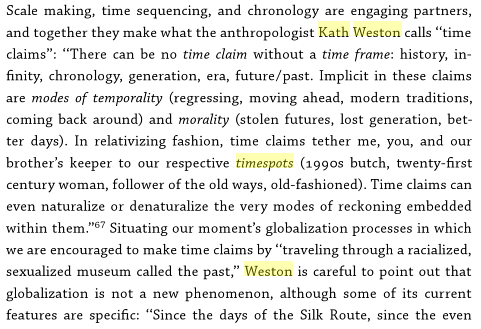===
Working with Hanhardt13, Tambe09, Das07, Whittier95 and other stuff such as Weston02 Gender in Real Time. (King12 too.)
What social movements are mentioned in each text? How do you identify them?
What social movements figure into its arguments centrally or otherwise? How can you tell?
What are the names of some of these movements: your names, their names, someone’s names. Where do these come from in your own knowledge?
What time periods constitute the background of the text? How did you figure this out?
What timespots matter most? Timeclaims? See Kath Weston’s Gender in Real Time and King’s comments on it King11 pp. 99-100.
In its particular way, methodologically, with its political visions, from a set of careabouts and "intellectual virtues," each of the books we are companioning now in the class teaches us about the following:
scale-making, time sequencing, chronology, time claims --
time frame: "history, infinity, chronology, generation, era, future/past";
modes of temporality: "regressing, moving ahead, modern traditions, coming back around":
morality: "stolen futures, lost generation, better days".
our relative timespots: how do we name some? For example, how are the "waves" employed here today? how are they figured as morality? as modes of temporality?
Create a timeline or other device for temporal visualization or dynamic use to put all these together in a syncretism that matters. Note the comments in previous post with links and other useful info.
what globalizing scale-making is involved? which parts of the "global" as new, as not new? how is it a "radicalized, sexualized museum called the past"?
===




No comments:
Post a Comment